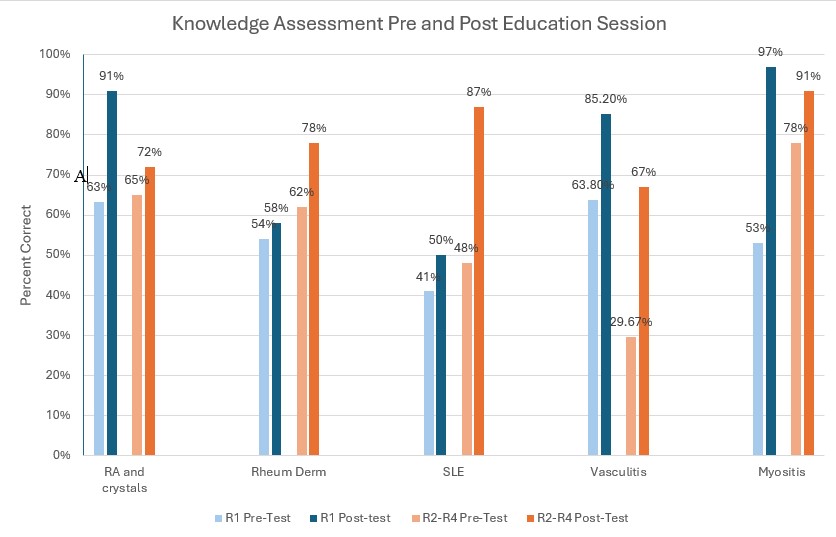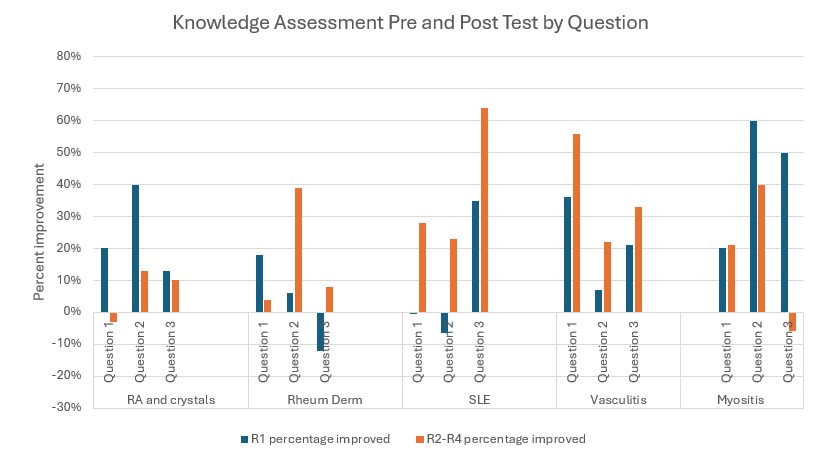Session Information
Session Type: Poster Session B
Session Time: 10:30AM-12:30PM
Background/Purpose: Rheumatology fellows play a critical role as educators for residents and offer unique perspectives on patient care. During the 2022-2023 academic year, fellows at the University of Rochester Medical Center (URMC) developed a longitudinal curriculum for internal medicine and internal medicine/pediatrics residents utilizing both objective knowledge questions and subjective feedback questions to assess efficacy of the lectures. During the 2023-2024 academic year, the educational series was modified to assess differential training for first year vs upper level residents.
Methods: During the 2023-2024 academic year, a needs-assessment was updated using data obtained during the pilot educational sessions in 2022-2023 and rheumatology core topics from the American Board of Internal Medicine Certification Examination Blueprint. Topics chosen included dermatologic manifestations of rheumatologic disease, vasculitis, systemic lupus erythematosus (SLE), myositis, and rheumatoid/crystalline arthritis. Lectures were given to first year residents (R1) and separately to second through fourth year residents (R2-R4) for each topic. Residents completed self-assessment questions created by the presenting fellow immediately before and after participation in didactics. A subjective questionnaire assessed effectiveness for resident academic training, applicability to inpatient rotations and clinic, and impact on management.
Results: There was improvement in knowledge from pre and post-test assessments for all rheumatology topics (Figure 1). The average pre-score was lower for R1 than for R2-R4 for all topics except vasculitis. The R1 group had a greater post-test improvement compared to R2-R4 for three of five lectures. There was variability of improvement by individual question, as some questions had fewer correct answers after the lecture (Figure 2). Residents found the sessions helpful for their academic training (96%), helpful for inpatient rotations and clinic (89%), and felt it would change their management (84%).
Conclusion: This project is an expansion on an innovative rheumatology fellow-initiated curriculum that continues to be an effective way to educate resident learners on rheumatology topics. Knowledge gain was seen with each topic, but splitting R1 and R2-R4 learners showed there may be more potential for targeted education early in the first year. Higher pre-test scores in the R2-R4 group suggests that there are external educational influences or experiences, such as patient encounters or exposure to previous lectures, that increase the knowledge base of this group. Limitations included limited number of matched pre and post-test samples and inconsistent resident attendance. Resident performance on individual post-test questions was variable, with some average scores decreasing after targeted education, suggesting that fellow teachers may benefit from additional training or support in either question writing or content delivery. Future iterations of this fellow-led curriculum will include additional support for fellows as teachers and focus on the impact of the initiative on the fellows as specialty educators.
To cite this abstract in AMA style:
Pokorny C, Kruzer K, Vertalino V, Barbut A, Marangoni R, Blatt A, Shah U, Osborne C, Marston B. The Impact of Rheumatology Fellow Initiated Curriculum Design on Resident Education for R1 versus R2-R4 Learners [abstract]. Arthritis Rheumatol. 2024; 76 (suppl 9). https://acrabstracts.org/abstract/the-impact-of-rheumatology-fellow-initiated-curriculum-design-on-resident-education-for-r1-versus-r2-r4-learners/. Accessed .« Back to ACR Convergence 2024
ACR Meeting Abstracts - https://acrabstracts.org/abstract/the-impact-of-rheumatology-fellow-initiated-curriculum-design-on-resident-education-for-r1-versus-r2-r4-learners/


